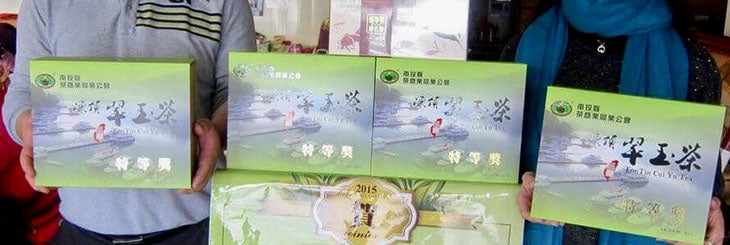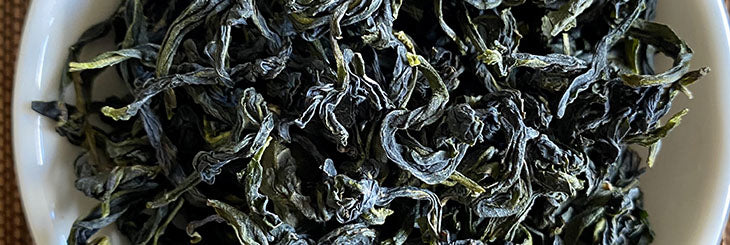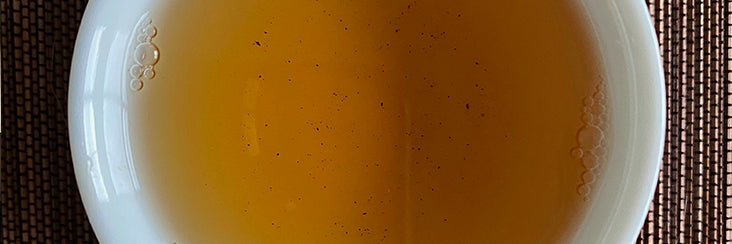Eco-Cha Tea Club

Competition Grade Wuyi Oolong Tasting Notes | Eco-Cha Tea Club
Wuyi was once the specialty tea cultivar of choice in the historical Songboling tea growing region in southern Nantou County. But it got replace with more prolific cultivars in recent decades. We are grateful to have a chance to experience this tea strain that really does stand on its own in comparison to the more popular strains. It has a robust character when made as a lightly oxidized, unroasted tea. And its hardy nature is able to withstand extensive roasting that other strains cannot.

Heavy Roast Wuyi Oolong Tea Tasting Notes | Eco-Cha Tea Club
We are kicking off our sixth year of the Eco-Cha Tea Club this month, with batch 61! And this month's batch of Heavy Roast Wuyi Oolong is a record breaker in that it is definitely the most thoroughly roasted batch of tea that we have shared to date. We think this tea will be appealing at this time of year — especially for our members who live in colder climates. This is a very hearty, rich, and warming brew. So we like to think it will make the holiday season even cozier!

Heavy Roast Wuyi Oolong Tea | Eco-Cha Tea Club
With natural farming, the trees mature more slowly, as they must fend for themselves and build immunity to naturally occurring pests without the artificial assistance of chemical farm products. But as our friend from whom we source this tea explained to us today, when the trees eventually develop a stable immunity, they are significantly different in their constitution than conventionally farmed tea trees. And this means the quality of leaf that is harvested from these trees is also notably different.

Eco-Farmed Specialty Roast Oolong Tea Tasting Notes| Eco-Cha Tea Club
Batch 60 of the Eco-Cha Tea Club brings us to a full five years of offering monthly editions of specialty Taiwanese teas! This month's edition was cultivated and crafted by one of our most respected sources of naturally farmed tea. He not only employs the most radical natural farming methods we know of, he also is continually refining processing methods to bring his produce to its fullest potential, based on the growing conditions of each season. Mr. Xie also produces our GABA Oolong Tea, which, like this month's batch, is one of his signature products.

Eco-Farmed Specialty Roast Oolong Tea | Eco-Cha Tea Club
This batch of tea was harvested last spring, and processed as a medium oxidized Oolong. The stems were then removed in preparation for extensive roasting. Mr. Xie proceeded to roast these leaves four times in total. The first roasting was done in the standard convection type oven to remove all remaining moisture from the leaves. The following 3 roastings were done in an oven designed for roasting coffee beans!

Eco-Farmed High Mountain Oolong Tea | Eco-Cha Tea Club Tasting Notes
This crop of tea is the most recent growth picked from new branches on the trees that were allowed to grow for four months or so, similar to our recent batch of Traditional Hong Shui Oolong that we offered last month. As with last month's batch, this tea was also affected by the Green Leafhopper, and other pests. This is inevitable, given that this is an organic farm and the summer months are most susceptible to bugs!

Eco-Farmed High Mountain Oolong Tea | Eco-Cha Tea Club
We can see how naturally these tea trees are allowed to grow. It's a wholly different farming method than conventional farming, and the produce from a farm like this is also next level. In our perception, based on visiting tea farms in Taiwan for over 20 years, this source is a rare and precious find. The combination of a pristine geographic location with an ideal micro-climate for tea production, and the natural farming methods are just not to be found. In a word, we love this farms, as well as its caretakers!

Traditional Hong Shui Oolong Tea Tasting Notes | Eco-Cha Tea Club
The full flavored character reflects the mastery that evolved from pre-modern tea producing methods — which our friend learned from his grandfather as a teenager. It's a rich, fruity, complex flavor profile with classic mineral notes, and a vibrant, truly satisfying finish. This, this is the real deal when it comes to traditionally made Oolong Tea from Nantou County, Taiwan!

Traditional Hong Shui Oolong Tea | Eco-Cha Tea Club
Batch 58 of the Eco-Cha Tea Club is a Hong Shui Oolong made in the traditional fashion by our friend in his home factory in Phoenix Village, Taiwan. He let his family plot of tea behind their traditional 3-sided farmhouse continue to grow after spring harvest in April until the last few days in July. This allows the tea trees to rejuvenate by growing naturally during the most vegetative phase of their annual cycle. He then harvested just the tops of the new growth before pruning his trees for fall harvest.

Top Award Winning Dong Ding Cui Yu Oolong | Eco-Cha Tea Club
Batch 57 of the Eco Cha Tea Club is a Top Award winning tea that was entered into the spring 2020 Nantou County Tea Trade Association's Dong Ding (Ton Tin) Cui Yu Oolong Tea competition. This association focuses on promoting tea production in lower elevation regions, namely Zhushan and Mingjian Townships in southern Nantou County. These towns are at the foot of the mountain below Lugu Township and the Shan Lin Xi high mountain tea growing region. Zhushan and Mingjian, along with Lugu are home to the densest population of tea makers in Taiwan.

Competition Grade Wenshan Baozhong Tea Tasting Notes| Eco-Cha Tea Club
This is what an award winning Wenshan Baozhong Tea looks like, in its dry leaf state, of course. Notice the uniformity in the size and coloration of the leaves. The yellow hues are only in the spine of the leaves, which would naturally protrude into a stem, but the stems have been removed, along with the larger, lighter colored, over-matured leaf stock. This uniformity of leaf material offers a pure flavor profile. It allows for a complexity of aromatic and flavor notes, but it comes from a uniform stock which is essential in producing a purity of character. This is a fundamental aspect of competition grade tea. It's not muddled. It's refined.

Honey Hong Shui Oolong Tasting Notes | Eco-Cha Tea Club
The Chinese "hong shui" means "red water", and the term has been adopted (or revived, depending on who you ask) as a name for heavily oxidized Oolong Tea. The name is used to designate a type of Oolong to stand on its own, and not be devalued by popular judging standards and marketing trends in Taiwan. The popular High Mountain Oolong Tea is a lightly oxidized tea with a bright golden, yellowish-green color. And even the competition standards set for Dong Ding Oolong Tea are a lighter golden-orange. But Hong Shui is, in fact, a proper tea on its own, and the level of oxidation is simply a variation in processing, not a fault or shortcoming in terms of its value. The processing methods to make this type of tea are actually how tea was made in Lugu (and many other places most likely), Taiwan, before tea became a commercial commodity.

